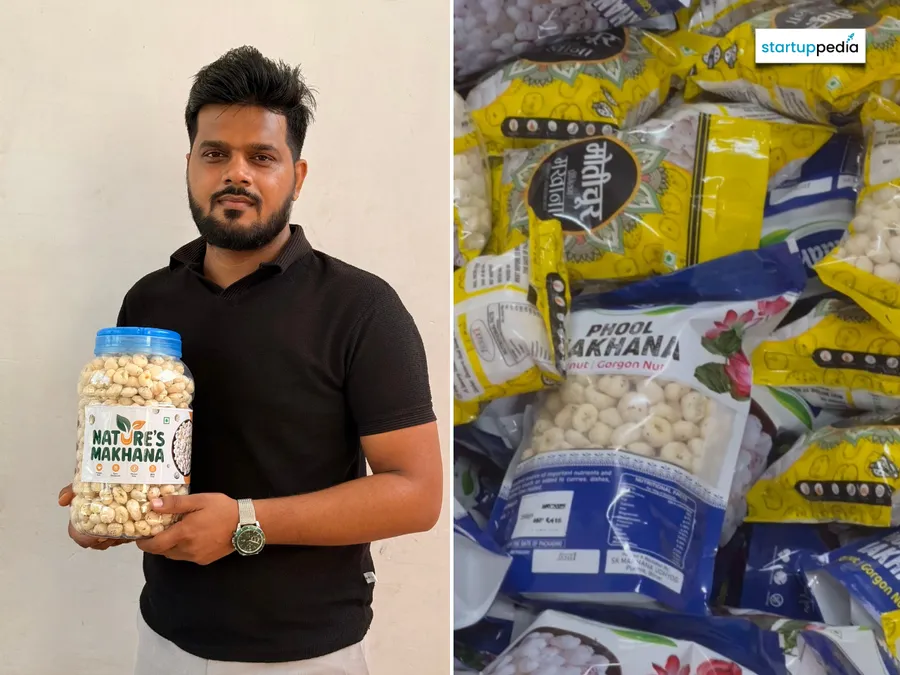Copyright startuppedia

"Bihar accounts for up to 85% of the country"s makhana (fox nuts) production. Recently, the crop has seen more hype than ever.Advertisment Fox nuts, in general, are rich in nutrients like fibre, carbohydrates, protein, and essential minerals like magnesium and potassium. Nadeem Iqubal"s father, Md. Raish has been working in the makhana sector for some years now. “But it has been very unorganized. My father had been selling only to buyers from Bihar. When a college project exposed me to the unbelievable potential of fox nuts, I decided to start Nature"s Makhana, under my father"s business, and expand it from scratch,” Nadeem Iqubal, co-founder of Nature"s Makhana, tells Startup Pedia in an exclusive interview. Founded in 2024, Nature"s Makhana is a Bihar-based superfood brand that sells numerous varieties of makhana to food companies across India. It currently has a monthly revenue between Rs 2 crore and Rs 3 crore. THE BACKGROUND Md. Raish is a businessman who has been working as a makhana wholesaler in Katihar in Bihar for about three decades. Thirty years ago, he had invested Rs 1.5 lakh in building a small factory and two makhana popping machines (phori units). However, the business wasn"t structured or digitized. His son, Nadeem Iqubal, went to Galgotias University in Noida to pursue an undergraduate degree in BBA. “In my final year of BBA, I was supposed to lead a project on makhana. That is when I conducted in-depth research and discovered how the sector of fox nuts remains largely unorganized. Plus, the seller margins get eroded due to the presence of middlemen – sometimes as many as two to three middlemen get involved,” Nadeem tells Startup Pedia. Nadeem also noticed that the final prices of makhana packs would get inflated from Rs 600 to Rs 1,200 – all because of the presence of middlemen and an evident lack of structured marketing. With this information, Nadeem Iqubal decided to start a B2B makhana business that was more structured, organized, and built on efficiency. “I told my father I wanted to do this, but he straight-up said no. He has always dreamt of me becoming a doctor or something like that. But I think I have a more business-oriented mindset, I knew I could scale the makhana business to reach across India,” entrepreneur Nadeem says. While his father didn"t wholeheartedly agree, he asked Nadeem to pursue an MBA and try doing what he wanted to in the makhana field. “In 2024, my BBA ended. I also started Nature"s Makhana in the same year. Currently, I am pursuing an MBA from Jain University in Bengaluru,” Nadeem says. Nadeem Iqubal in his office Read More: Guwahati Woman Clocked Rs 2 Cr By Selling Art Jewellery You've Never Seen Before - Chilli, Scorpion, And Durga Earrings JOURNEY AND CHALLENGES Nadeem Iqubal borrowed Rs 1 crore from his father"s makhana business and started Nature"s Makhana under his guidance and experience. This amount was split into: Rs 80,00,000 went into the product cost Rs 8,00,000 went into obtaining material for packaging Rs 12,00,000 was taken up for miscellaneous expenses like rent, salaries, and wages His journey points included: Working on the product and packaging side of the brand from July 2024 to August 2024. Nadeem originally wanted to build a website first, but then made a conscious decision to focus on grading and branding of the makhanas first. He connected with vendors (some that came from his father"s contacts and others that were new) to discuss the business and understand the product demand. Connecting with 50+ farmers from the Katihar district in Bihar and bringing them into a value chain where they would grow and sell makhanas to Nature"s Makhana. “I also added 100 fixed people in the network who pop the raw makhanas and make them edible,” startup founder Nadeem Iqubal tells Startup Pedia. Continuing to use the factory that his father, Md. Raish had established over 6 acres on the family"s own land. “I also worked on the packaging aspect. In the makhana business, my father has taught me, it is important for even 10 grams of makhana to completely fill up the pack you are putting it in. Also, the makhanas should be visibly white in colour,” the entrepreneur explains. Working on establishing a warehouse in Khari Boali (a historic wholesale and grocery market) in Old Delhi. From September to October 2024, Nadeem started procuring, grading, and packaging the makhanas in Katihar and sending them to be stored in this warehouse. “We also hired a salesperson who would roam the market, connect with makhana buyers and businesses, and tell them about Nature"s Makhana"s prices and products. This worked out very soon for us. The thing is, you don"t need to work very hard in marketing makhanas because the demand is already skyrocketing,” Nadeem Iqubal says. Nadeem Iqubal with his team Read More: Bengaluru Entrepreneur Makes Bindis With A Funky & Cultural Twist; Clocks Rs 20 Lakh – Now Worn By Kajol, Kareena Kapoor, Tamannaah Bhatia THE SOCIAL MEDIA GAME Entrepreneur Nadeem Iqubal has adopted a simple strategy – buying makhanas from farmers when the prices are down. When he started selling in October 2024, he would mostly sell to two to three vendor connections of his father, Md. Raish. The business did pick up - but didn"t reach pan-India, as Nadeem had envisioned it. “We were clocking roughly Rs 1 crore in monthly revenues from October 2024 to January 2025,” he says. In 2025, Nadeem Iqubal thought about leveraging the power of Instagram. For starters, he began posting pictures of wholesale makhana at his factory and warehouse. “The response wasn"t great. Six months ago, I started making reels and taking them live on Nature"s Makhana's Instagram handle,” startup founder Nadeem shares. He also started running ads costing Rs 500 on his channel. The first time he boosted his reel, he immediately received two orders worth Rs 3 lakh. “I immediately doubled down on this strategy. And it worked out great for us. I kept posting simple reels with just text-on-screen, makhana visuals, and some background music. Then, I would run ads on them. Eventually, the makhana orders started growing,” Nadeem explains. “Today, if I get more than 10,000 views, I easily get more than 100 calls from across India, which my team then filters, sends product catalogue to, and takes orders from. And all this is without me even showing my face on the reels,” entrepreneur Nadeem says. Monthly, Nature"s Makhana"s Instagram handle averages a view count of 7 to 8 lakh views. Nature's Makhana team Read More: Lucknow woman almost failed at engineering, then quit a Rs 1 Cr salary job in Dubai – now sells oat milk; clocked Rs 2.2 Cr revenue NATURE"S MAKHANA: HANDPICKED, QUALITY MAKHANAS ALWAYS Currently, Nature"s Makhana operates as a Bihar-based superfood brand that sells numerous varieties of makhana to food brands and firms across India. The brand operates in the realm of B2B raw makhana trade and sells only graded, raw makhanas. Additionally, it offers white-labelling services where other businesses can sell the makhanas under their name. “We take our grading practice very seriously – each makhana is sorted by size and quality before sale. The thing is that grading determines price. For instance, larger, evenly popped makhanas fetch a higher value,” startup founder Nadeem says. “Grading is something that I started. Earlier, my father was only dabbling in the tauli business of makhana. This means selling the makhanas only in bulk, measured by a tauli, which is a jute sack used as a unit of trade. But now, with Nature"s Makhana, we have started categorizing the makhanas by size and quality,” he adds. Presently, the minimum order quantity that Nature"s Makhana takes is 150 kilograms. From March 2025 to September 2025, the Bihar-based superfood brand has been clocking an average monthly revenue of Rs 3 crore. Nadeem has successfully forged connections with and supplied Nature"s Makhana"s products to brands and businesses across New Delhi, Madhya Pradesh, Bihar, West Bengal, Punjab, Maharashtra, Jammu, Haryana, Jharkhand, Karnataka, Odisha, Rajasthan, and Gujarat. As far as the unit economics are concerned, the average price of 150 kilograms of makhanas is Rs 1,35,000. Rs 75,000 goes into production (paying farmers for the makhanas). Rs 15,000 is taken up by grading processes. Rs 10,000 goes into packaging the makhanas. Rs 14,750 accounts for miscellaneous expenses like rent and salaries. Finally, Rs 20,250 is the profit margin Nature's Makhana PERSONAL FRONT Nadeem"s day is divided into spending time at the office and supervising the makhana packaging at Nature"s Makhana. He currently doesn"t attend his MBA college as much, as he believes he is doing a practical MBA by operating Nature"s Makhana. “My father doesn"t show it, but I think he is proud that our makhanas have found their place across India. He still doesn"t know that most of our orders come in from Instagram reels,” he laughs. “Scaling Nature"s Makhana is my single aim now. I know how much makhanas are valued, not just in India but also the world. Coming from Bihar, this superfood needs the right amount of structure and organization to be able to benefit everyone in the chain – the growers, wholesalers, retailers, and customers,” Nadeem Iqubal concludes. Read More: Meet Mumbai Entrepreneur Who Started Lab-Grown Diamond Jewellery Brand By Partnering With India"s Leading Gold Platform FAQ Q. When was Nature"s Makhana founded? A. Nature"s Makhana was founded by 2024. Q. Who is the founder of Nature"s Makhana? A. Nadeem Iqubal has started Nature"s Makhana under Md Raish"s, his father"s guidance. Q. What does Nature"s Makhana do? A. Nature"s Makhana is a Bihar-based superfood brand that sells numerous varieties of makhana to food brands across India. Q. What is the revenue of Nature"s Makhana? A. From March 2025 to September 2025, the Bihar-based superfood brand has been clocking an average monthly revenue of Rs 3 crore. "



